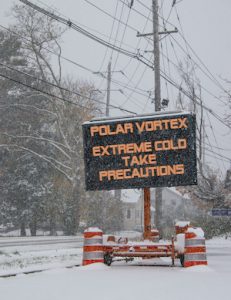Climate Change
The recent freeze and resulting power outage in Texas is one sign of a weather-related roller coaster ride caused by climate change
The recent freeze and resulting power outage in Texas is one sign of a weather-related roller coaster ride caused by climate change
Some scientists theorize that the recent freeze and resulting power outage in Texas is one sign of a weather-related roller coaster ride caused by climate change caused by polar vortex.
No one knows for sure how much of a role climate change has played in the frequency of cold weather that hit as far south as Texas in February 2021, the result of a phenomenon known as a polar vortex. But one growing segment of the scientific and environmental community believes it is tied to global warming.
In an in-depth look at the disaster, Scientific American reported that the role of climate change in what happened remains “unclear.” However, they also report that a “growing body of scientific research” suggests extreme cold events may be the result of a warming planet.
“The science is hardly settled, but the initial theory holds that as temperatures in the Arctic rise, cold air is pushed into lower latitudes,” the site reported. “The result is a strange dichotomy where winters become warmer, on average, but can be punctuated by frigid blasts of polar air.”
 The Polar Vortex in Texas
The Polar Vortex in TexasA polar vortex is an area of swirling winds in a low pressure system around the Arctic. In some years, the vortex wobbles off its usual path or breaks into segments, bringing blasts of frigid temperatures to the south, according to the National Oceanic Atmospheric Administration (NOAA).
In the case of the February 2021 event, the vortex traveled as far as south Texas. The resulting storm, now called Winter Storm Uri, knocked out power for 4.5 million people. It also resulted in the deaths of more than 100 people. Officials expect the final death toll to exceed the one after Hurricane Harvey in 2017.
The storm also cost emergency services $100 million and is expected to cost insurers alone about $20 billion.
Scientists interviewed by Scientific American said there is growing evidence that events such as Winter Storm Uri are the result of climate change. For example, Judah Cohen, a climate scientist and director of seasonal forecasting at Atmospheric and Environmental Research, said that the storm is a “textbook case” of what he believes are climate change-caused reasons that polar vortexes go so far south from the Arctic.
His research has found a statistical correlation between warm spells in the Arctic and extreme winter weather in the United States. The theory is that a rise in temperature high in the atmosphere can knock the polar vortex farther south.
According to Scientific American, extreme heat in the stratosphere started to make the polar vortex wobbly in January 2021, triggering lower temperatures and heavy snowfall across the Northeast.
Other scientists also connect polar vortex storms with climate change. For example, University of Georgia meteorology professor Marshall Shepherd told USA Today that “there is evidence that climate change can weaken the polar vortex, which allows more chances for frigid Arctic air to ooze into the Lower 48.”
But will more happen in the future? In an article before the event in Texas, scientists who spoke with National Geographic said the odds of more storms happening have increased in recent years. They attributed the breaking of the stratospheric polar vortex into two pieces in 2021 on a sudden 100 degree surge in temperatures over Siberia. As temperatures increase globally – the decade just ended was the hottest on record – it seems likely that such storms will increase in number.
However, they also said researchers need to further study the connection between global warming and climate change. Given the impact of the latest storm, it’s something worth keeping an eye on in the years to come – no matter how far south you live.